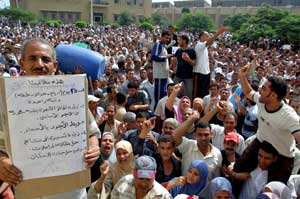Egyptian textile workers win strike
By
G. Dunkel
Published Oct 6, 2007 11:31 AM
Some 27,000 textile workers in Egypt won a resounding victory on Sept. 29,
following a one-week strike at El Misr Spinning and Weaving Factory in Mahalla
el-Kobra, an industrial city in the Nile Delta north of Cairo.
The workers occupied the plant and set up their own security.
Following this action, the company and the state-run union agreed to give the
workers an immediate bonus equivalent to 90-days’ pay; workers’
days on strike will be treated as paid vacation days; the corrupt and wasteful
company president will be fired; there will be an annual 7-percent increase in
pay, and the Ministry of Investment will set up a commission to study granting
an additional 40-day bonus.
The workers were extremely militant and had prepared for a long fight. Video
clips show Mahalla workers chanting, “We will not be ruled by the World
Bank! We will not be ruled by colonialism!” Sayyid Habib, a veteran union
leader, told the Voice of America on Sept. 28, “We are challenging the
regime.”
According to Joel Beinin, director of Middle East Studies at the American
University in Cairo, the textile workers’ challenge to the economic
policies of the regime drew widespread support from the people of Mahalla,
other textile workers in the area, railroad workers, and teachers and other
intellectuals.
The World Bank on Sept. 26 ranked Egypt as the most improved investment economy
in the world, just a few days after U.S. Secretary of State Condoleezza Rice
dined in New York with Egypt’s foreign minister. Washington has
criticized the civil rights record of Egyptian President Hosni Mubarak’s
regime in words, but considers Egypt its main ally in the Middle East outside
of Israel.
There have been than 200 major strikes in Egypt since 2004. The day the Mahalla
workers went back to their jobs, hundreds of workers from the Tanta Linseed and
Oils Co. in the same province as El Misr Spinning went out over very similar
issues. The whip of inflation has lashed Egyptian workers hard. The official
rate is 12 percent but many economists consider this half the real figure. The
price of fresh vegetables, cultivated widely within Egypt, went up by 38
percent, which is a shock to people trying to feed their families.
In a news release, the Coordinating Committee of the Mahalla workers says
international solidarity was one of the most important components of their
victory.
The first solidarity letter came from the General Federation of Trade Unions of
South Africa on Sept. 26, followed by one from the International Confederation
of Arab Trade Unions, which criticized the role of the official
state-controlled union in the struggle. Then the National Trade Union of
Education Workers of South Africa, one of the largest unions in that country,
chimed in, supporting the Mahalla workers’ right “to organize, to
associate and to strike.” Italian unions sent a message of steadfast
support. The International Textile, Garment and Leather Workers wrote a letter
to President Mubarak criticizing his attempts to put leaders of the strike in
jail. The International Trade Union Confederation also protested the arrest and
detention of strike leaders.
As globalization spreads industrial activity throughout the world,
international solidarity is going to grow ever more important.
Articles copyright 1995-2012 Workers World.
Verbatim copying and distribution of this entire article is permitted in any medium without royalty provided this notice is preserved.
Workers World, 55 W. 17 St., NY, NY 10011
Email:
[email protected]
Subscribe
[email protected]
Support independent news
DONATE


